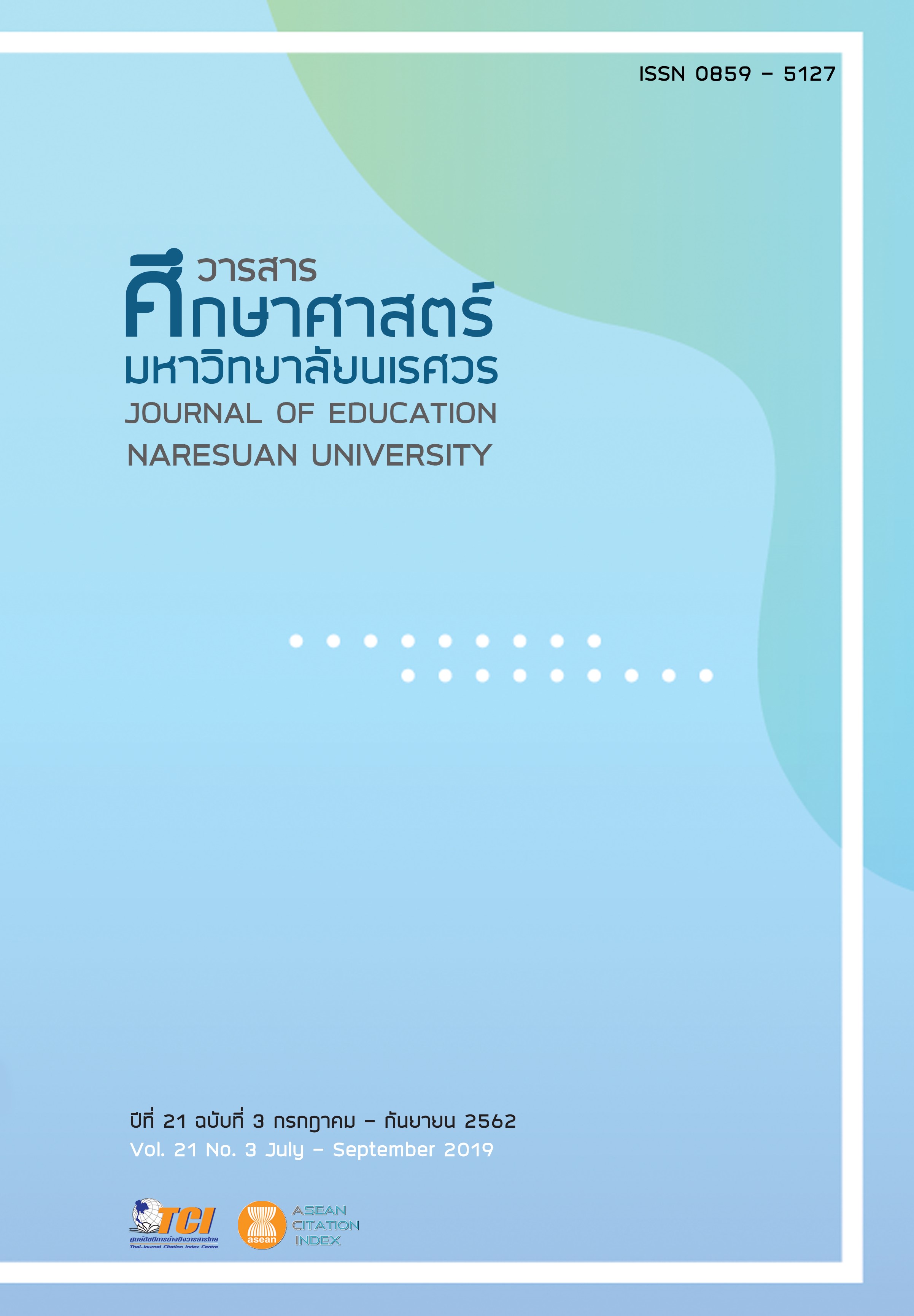ผลการจัดการเรียนรู้โดยใช้วิธีการทางวิทยาศาสตร์ร่วมกับเทคนิคการใช้คำถามระดับสูง เพื่อพัฒนาผลสัมฤทธิ์ทางการเรียน ทักษะกระบวนการทางวิทยาศาสตร์ขั้นบูรณาการ และความสามารถในการคิดวิเคราะห์ ของนักเรียนชั้นมัธยมศึกษาปีที่ 1 (THE EFFECTS OF LEARNING MANAGEMENT USING SCIENTIFIC METHODS WITH HIGHER-ORDER QUESTIONS TO PROMOTE LEARNING ACHIEVEMENT, INTEGRATED SCIENCE PROCESS SKILLS, AND ANALYTICAL THINKING ABILITY OF 7 GRADE STUDENTS)
Main Article Content
Abstract
การวิจัยครั้งนี้มีวัตถุประสงค์เพื่อเปรียบเทียบผลสัมฤทธิ์ทางการเรียน ทักษะกระบวนการทางวิทยาศาสตร์ขั้นบูรณาการ และความสามารถในการคิดวิเคราะห์ของนักเรียนที่ได้รับการจัดการเรียนรู้โดยใช้วิธีการทางวิทยาศาสตร์ร่วมกับเทคนิคการใช้คำถามระดับสูง ก่อนเรียนและหลังเรียน และเปรียบเทียบผลสัมฤทธิ์ทางการเรียน ทักษะกระบวนการทางวิทยาศาสตร์ขั้นบูรณาการ และความสามารถในการคิดวิเคราะห์ของนักเรียนที่ได้รับการจัดการเรียนรู้โดยใช้วิธีการทางวิทยาศาสตร์ร่วมกับเทคนิคการใช้คำถามระดับสูง หลังเรียนกับเกณฑ์ร้อยละ 70 กลุ่มตัวอย่างที่ใช้ในการวิจัย ได้แก่ นักเรียนชั้นมัธยมศึกษาปีที่ 1 โรงเรียนดาราสมุทร ศรีราชา
ภาคเรียนที่ 2 ปีการศึกษา 2559 จำนวน 1 ห้องเรียน ได้มาโดยวิธีการสุ่มแบบกลุ่ม จำนวน 38 คน เครื่องมือที่ใช้ในการวิจัย ประกอบด้วย 1) แผนการจัดการเรียนรู้โดยใช้วิธีการทางวิทยาศาสตร์ร่วมกับเทคนิคการใช้คำถามระดับสูง 2) แบบทดสอบวัดผลสัมฤทธิ์ทางการเรียน 3) แบบทดสอบวัดทักษะกระบวนการทางวิทยาศาสตร์ขั้นบูรณาการ 4) แบบทดสอบวัดความสามารถในการคิดวิเคราะห์ การวิเคราะห์ข้อมูลโดยใช้ค่าเฉลี่ย ส่วนเบี่ยงเบนมาตรฐาน และสถิติการทดสอบที ผลการวิจัย พบว่า
1. ผลสัมฤทธิ์ทางการเรียนของนักเรียน หลังการจัดการเรียนรู้โดยใช้วิธีการทางวิทยาศาสตร์ร่วมกับเทคนิคการใช้คำถามระดับสูง สูงกว่าก่อนเรียนและสูงกว่าเกณฑ์ร้อยละ 70 อย่างมีนัยสำคัญทางสถิติที่ระดับ .05
2. ทักษะกระบวนการทางวิทยาศาสตร์ขั้นบูรณาการของนักเรียน หลังการจัดการเรียนรู้โดยใช้วิธีการทางวิทยาศาสตร์ร่วมกับเทคนิคการใช้คำถามระดับสูง สูงกว่าก่อนเรียนและสูงกว่าเกณฑ์ร้อยละ 70 อย่างมีนัยสำคัญทางสถิติที่ระดับ .05
3. ความสามารถในการคิดวิเคราะห์ของนักเรียน หลังการจัดการเรียนรู้โดยใช้วิธีการทางวิทยาศาสตร์ร่วมกับเทคนิคการใช้คำถามระดับสูง สูงกว่าก่อนเรียนและสูงกว่าเกณฑ์ร้อยละ 70 อย่างมีนัยสำคัญทางสถิติที่ระดับ .05
THE EFFECTS OF LEARNING MANAGEMENT USING SCIENTIFIC METHODS WITH HIGHER-ORDER QUESTIONS TO PROMOTE LEARNING ACHIEVEMENT, INTEGRATED SCIENCE PROCESS SKILLS, AND ANALYTICAL THINKING ABILITY OF 7 GRADE STUDENTS
The purposes of this research were to compare learning achievement, integrated science process skills, and analytical thinking ability of students after using scientific methods with higher-order questions before and after learning, and to compare learning achievement, integrated science process skills, and analytical thinking ability of students after learning with the scientific methods with higher-order questions with 70 percent criteria.The participants were 38 of grade seven students who studied in the second semester of 2016 academic year from Darasamutr Sriracha School using cluster random sampling. The research instruments consist of 1) scientific methods with higher-order questions lesson plans, 2) learning achievement test, 3) integrated science process skills test, and 4) analytical thinking ability test. The data were statistically analyzed by mean, standard deviation, and t-test. The results of this study indicated that:
1. Learning achievement of students after learning with the scientific methods with higher-order questions were higher than before learning and higher than 70 percent criteria with a statistically significant at .05 level.
2. Integrated science process skills of students after learning with the scientific methods with higher-order questions were higher than before learning and higher than 70 percent criteria with a statistically significant at .05 level.
3. Analytical thinking ability of students after learning with the scientific methods with higher-order questions were higher than before learning and higher than 70 percent criteria with a statistically significant at .05 level.
Article Details
The owner of the article does not copy or violate any of its copyright. If any copyright infringement occurs or prosecution, in any case, the Editorial Board is not involved in all the rights to the owner of the article to be performed.
References
2. Human Resources Institute. (2001). To strengthen by the teaching of science to excellence in the educational system of Thailand: A strategy to support scientific personnel to develop in the globalization. Bangkok: Thammasat University Printing House. [in Thai]
3. Kosum, S., & Khumwatjanang, D. (2001). Children teaching to think. Bangkok: Tip Publication. [in Thai]
4. Moolkum, S., & Moolkum, A. (2004). 21 learning management: For development of thinking process (5th ed.). Bangkok: Parbpim Printing. [in Thai]
5. Naluan, N. (2013). The results of 7E Learning Cycle Model with questioning technique on analysis thinking abilities and scientific learning achievement of Prathomsuksa 5 students (Master thesis). Songkhla: Thaksin University. [in Thai]
6. National Institute of Educational Testing Service. (2016). Results educational testing basic national (O-NET) Secondary 3. Retrieved March 2, 2016, from https://www.onetresult.niets.or.th [in Thai]
7. Onyon, N. (2008). Effects of inquiry-based science instruction using higher-order questions on analyzing and synthesizing thinking ability of lower secondary school students (Master thesis). Bangkok: Chulalongkorn University. [in Thai]
8. Poosiris, J. (2007). The development of students’ analytical thinking and science learning achievement at grade 9 through the use of scientific method based on John Dewey (Master thesis). Khon Kaen: Khon Kaen University. [in Thai]
9. Rotrangkha, W. (2001). Science teaching to accentuate the process skill (2nd ed.). Bangkok: Institue of Academic Development. [in Thai]
10. Saiyot, L., & Saiyot, A. (1995). Educational research techniques (4th ed.). Bangkok: Suviriyasarn. [in Thai]
11. Soontornpak, S. (2016, February 15). Head of Science Department. Interview. [in Thai]
12. Sutthirat, C. (2010). 80 innovative learning management that focuses on the learners (3rd ed.). Bangkok: Danex Intercorporation. [in Thai]
13. Wiangwalai, S. (2013). Learning management. Bangkok: Odeon Store. [in Thai]
14. Wichianrat, C., Chaiprasert, P., & Srisanyong, S. (2016). A study on the effects of active learning method in hydrocarbon derivatives for grade 12 students. Journal of Education Naresuan University, 18(2), 144. [in Thai]


